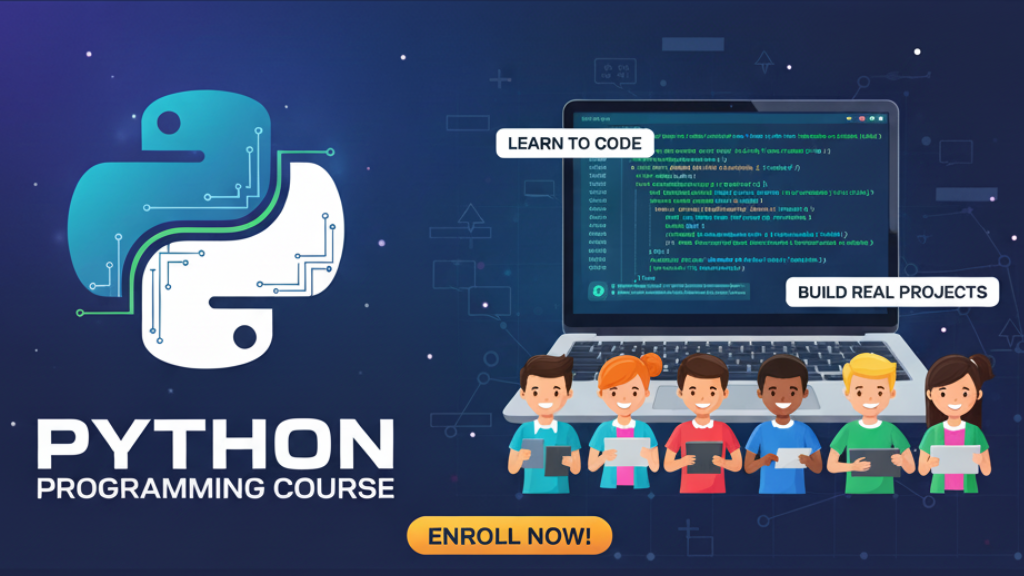
Advance Python Training
- Posted by JBCI
- Categories IT Language Training
Course Outline:
This course structure provides a comprehensive guide through Python programming, covering essential topics and ending with real-world applications and project development. The course can be delivered over several weeks, with hands-on exercises and assignments to reinforce learning.
Module 1: Introduction to Python
- What is Python?
- History and overview
- Features of Python
- Python’s role in modern software development
- Setting up the Python environment
- Installing Python and IDE (e.g., VS Code, PyCharm)
- Introduction to the Python Shell/Interpreter
- Running Python programs
- First Python Program
- “Hello, World!” program
- Syntax and structure of Python code
- Writing and executing Python scripts
- Basic Data Types
- Integers, floats, and strings
- Type conversion
- Variables and assignment
- What is Python?
Module 2: Control Flow and Loops
- Conditional Statements
- if, elif, else statements
- Comparison operators
- Logical operators
- Loops
- for loop
- while loop
- break and continue statements
- Nested Loops and Conditionals
- Combining loops and if statements
- Practical examples (e.g., number guessing game)
- Conditional Statements
Module 3: Functions and Modules
- Functions in Python
- Defining and calling functions
- Function arguments and return values
- Scope and lifetime of variables
- Lambda Functions
- Syntax of lambda expressions
- Using lambda functions with
map(),filter(), andreduce()
- Modules and Packages
- Importing modules
- Python Standard Library overview
- Installing and using external libraries with
pip - Writing your own modules
- Functions in Python
Module 4: Data Structures in Python
- Lists
- Creating, accessing, and modifying lists
- List methods and operations (append, remove, sort, etc.)
- Nested lists
- Tuples
- Tuple creation and immutability
- Tuple methods and use cases
- Dictionaries
- Key-value pairs
- Adding, removing, and modifying dictionary entries
- Iterating through dictionaries
- Sets
- Set operations (union, intersection, difference)
- Set methods and uniqueness
- List Comprehensions
- Introduction to list comprehensions
- Advanced usage (nested comprehensions)
- Lists
Module 5: Object-Oriented Programming (OOP)
- Introduction to OOP
- What is OOP?
- Key concepts: Class, Object, Method, Attribute
- Creating Classes and Objects
- Defining a class and creating objects
- Instance variables and methods
- Inheritance
- Base classes and derived classes
- Overriding methods
- Polymorphism
- Method overriding and method overloading
- Encapsulation
- Private and public attributes
- Getters and setters
- Abstraction
- Abstract classes and methods
- Practical use cases of OOP in Python
- Introduction to OOP
Module 6: File Handling
- Reading and Writing Files
- Opening, reading, and writing to files
- File modes (
r,w,a, etc.) - Using
withstatement for file handling
- Working with CSV Files
- Reading and writing CSV data
- Using the
csvmodule
- Working with JSON Files
- Reading and writing JSON data
- Using the
jsonmodule
- Reading and Writing Files
Module 7: Error Handling and Debugging
- Exceptions in Python
- What are exceptions?
- Try, except, else, and finally blocks
- Common Python Errors
- Syntax, runtime, and logical errors
- Debugging techniques
- Custom Exceptions
- Creating custom exceptions for error handling
- Exceptions in Python
Module 10: Mini Project & Exercises
- Implementing small coding projects to reinforce learning
- Solving programming exercises and challenges
- Applying learned concepts to solve practical problems
- Reviewing and discussing code to improve coding skills
At JBCI, we are passionate about empowering individuals with the knowledge and skills needed to thrive in today’s digital world. Established in 2021, we have been at the forefront of providing high-quality computer education and training to students of all ages and backgrounds.
